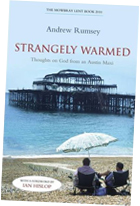| |
|
|
| Six feet under |
 |
April 2003
Hanging around churchyards and cemeteries, as I tend to do in my line of work, can have a curious effect upon one's outlook on life. Just as roadies become more "rock n' roll" with every amp they unload, so – if they're not careful – those who take funerals can easily end up becoming funereal. Wearing muted colours, that sort of thing, and nodding wistfully whenever a hearse wafts past.
Many is the time my wife has rightly sniggered at the "doubt they'll make it through the winter" attitude I can display towards any member of my flock who develops as much as a light sniffle.
It's perhaps not surprising that Hamlet-like ponderings should become second nature when one spends so much time among Yorick and his chums. My local cemetery in South London is one of those fascinating Victorian ones which boast a fascinating roster of notables. Within its walls, for example, can be found Thomas Crapper, the inventor of the water closet and whose joyous name has always seemed to me proof of God's intervention in the affairs of men.
W.G. Grace, the preposterously-bearded cricketer also resides there, as does one William Walker, an early diver whose legacy is to have rescued Winchester Cathedral by diving beneath its waterlogged foundations and gradually shoring them up with concrete. Every day for nearly six years, and working in total darkness, Walker would plunge to the slimy depths with no more than a rubber air hose to link him to safety.
When the cathedral was re-opened in 1912 by King George V, the latter proclaimed that Walker had "saved the cathedral with his own two hands", an accolade Walker dubbed as the proudest moment of his life. After all that, the poor fellow died of influenza six years later – though one imagines burial held few fears for him.
Human stories both charming and terrible abound in these places – they build up like the layers of loam and leaf and, if you can dare to listen, speak with an often-deafening silence. It's an obvious observation, but the simple fact there are so many people yet so little noise never fails to impress me. As if grave or glory finally teach us to pipe down about ourselves.
As Lent's long, chocolate-free weeks reach their climax, we may be reluctant to dwell on their seemingly po-faced refrain, "remember you are dust and to dust you shall return". Especially, one might add, on a website you are reading for light relief. But confident, even light-hearted reckoning with mortality is well worth developing, and an endangered hallmark of the Christian life.
Call me an old misery-trousers, but faith needs to be death-affirming before it can bring to life; be tragedy before it can be comedy. It must, as the playright Dennis Potter observed before his death, be primarily "in the wound not the bandage".
In a solution-based world, it is the most natural thing to give a positive, solution-based faith, rushing to give answers without letting the great questions really sink in. But unless we let the realities of life and death weigh us like William Walker down to the foundations of things, the church risks a soggy collapse.
Both wit and witness sound shallow when they don't sound the depths – something the Psalmists were at pains to explain, as was the ancient writer of the Book of Ecclesiastes. Usually remembered for its "vanity, vanity, all is vanity" bits, and – thanks to the Byrds – the phrases from "Turn, Turn, Turn", Ecclesiastes has another, surprisingly upbeat, chorus illuminating its verses.
Having spent a couple of chapters commenting with heavy irony on how dreadful things are – the biblical equivalent of those "tell me again how lucky I am to work here" circular emails – he frequently returns to lines like this:
"Go, eat your food with gladness and drink your wine with a joyful heart, for it is now that God favours what you do."
Amidst the uncomfortable comments on chaos and death, there is the glowing sense that our stories should be marked by celebration and gratitude: that our mortality need not mean a retreat from life. Underpinning it all is the suggestion of a God who can handle both height and depth.
Christian faith can be true to life only because it is true to death. This is Easter's remarkable heart of darkness. As the novelist and theologian Frederick Buechner writes in his wonderful book, Telling the Truth:
"The pressure on the preacher is to promote the gospel, to sell Christ as an answer that outshines all the other answers by talking up the shining side, by calling even the day of his death Good Friday when if it was good, it was good only after it was bad, the worst of all possible Fridays".
A life that guffaws forth the news of resurrection is only possible when, like Mary, we have waited long hours by the tomb. When we have experienced the deafening silence of that forgotten Saturday on Easter's Eve. This is the comic timing of the gospel, and we miss the force of it when we rush to the punchline.
Now, if you'll excuse me, there are some mourners at a certain person's graveside looking a little flushed... |
|
|
 |
 |
 |
| Strangely Warmed by Andrew Rumsey is now available as a book. |
 |
 |
 |
 |
 |
| Stephen Tomkins' regular column of tales of religious lunacy from the far reaches of the Net |
 |
 |
 |
| Mark Howe's regular rant about Internet culture |
 |
 |
 |
| Also by Stephen Tomkins... a regular round-up of the saints of yore who were one wafer short of a full communion |
| |
|
|
|
|


